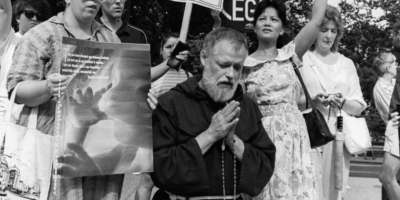Love. Marriage Only Connect…
Twentysomething sheltered Hasidic girl falls in love with confused non-Jew, despite her father’s opposition. (“Nick & Rachel” an urban romance by New Yorker Zalisa Rabin.) Thirty-something assimilated Jewish filmmaker documents attraction to Lubavitch for once assimilated women. (“The Return of Sarah’s Daughters” by Californian Marcia Jarmel.) Fifty-something Argentinean Jewish woman trains a non-Jewish manto pose as her Jewish fiance, and falls in love with him, in the process. (“Autumn Sun,” a feature starring two of Argentina’s top actors, directed by Eduardo Mignogna.)
We’re talking about some of the brightest films at the 17th Annual San Francisco Jewish Film Festival, which included a handful of compelling love stories and one equally compelling documentary: “The Return of Sarah’s Daughters,” by Marcia Jarmel, about Lubavitch’s appeal, examined through a feminist filter.
“Sarah’s Daughters,” which premiered at the San Francisco Jewish Film Festival this year shortly after winning the Judah Magnes Museum Video Competition, traces the religious quests of two 30-something women along with the ongoing theological struggles of the 38-year-old filmmaker.
Jarmel, a feminist drawn to the Orthodox community, is intrigued by bright, well-educated feminists finding a place in the Hasidic world, but she’s not buying the program. She follows the Lubavitch and post-Lubavitch search of Myriam, who is unable to abandon her lesbian identity. Myriam describes being told by a rabbi, “You‘re a tragic figure. After the Holocaust, it’s important to marry and have kids. Have a [lesbian]lover on the side.” She says she”never found that the Orthodox or gay lesbian community filled my needs. If you didn’t conform, you couldn’t belong.” She seems to have resolved her search as a Reconstructionist rabbinical student with a lesbian partner who is now ordained.
Rus (Ashkenazic for “Ruth”) is the more intriguing searcher. A big, bright, high-energy social worker, she embraced Hasidic Judaism in college the moment she stepped across the threshold of a Hasidic home for Shabbos. The photo of the Lubavitcher Rebbe is ever-present, looking over Rus’s shoulder. Her family in Buffalo, who still call her Darcy, are troubled that she won’t attend the family bar mitzvahs, but her father concludes that people like his daughter will preserve Judaism for the future. At the close of the film, Jarmel raises the question, “Now that I have a child, the search is more pressing. What will I pass on?”
The question hangs heavily for Rus. Since the completion of “Sarah’s Daughters,” Rus has divorced after three-plus years of marriage, and is engaged to remarry this spring. She has yet to produce a child. Rus’s father may applaud her observance, but in the most Orthodox of communities, women’s primary role remains preserving Judaism through their children. For the “barren” woman, life in this highly traditional world can be as wretched as it was in biblical times.
Hopefully, Rus will be spared this fate, but it’s a concern that a sensitive filmmaker like Jarmel just might consider taking on.


